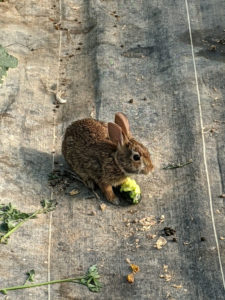
I just submitted the yearly application for organic certification for Firefly Fields. At some point in the arduous process between reviewing the thirty plus crops I am growing and going through the minutiae of post harvest crop handling and packaging I usually ask myself, “What is the point of being ‘certified organic’?”
It’s for Fred! And all his friends. The birds, bees, turtles and trees. The snakes, butterflies, foxes, and dragonflies. It’s for all the critters, creatures, and living things that share this land.
Okay, sure. But what does it mean to be “certified organic”?
In practice this looks like building soil fertility and health, measured by yearly soil tests, through cover cropping, composting, natural non-petroleum amendments that are OMRI certified, and crop rotation. I don’t use any pesticides, fungicides, or herbicides in my fields, though certified organic farms are allowed to use some that are made from more natural sources. And, out of the forty or more different seed varieties I am going to be growing this year, only a handful are not certified organic because there are no certified organic options available. (GMO seeds and seeds treated with specific substances are not allowed in organic production regardless.)
The goal of all this, and the many dozens of other practices, is to build a holistic and healthy ecosystem in which the farm is able to grow an abundance of exceptional produce. Of course it is possible to do all of that without going through the certification process, and many farms do. But unless I am selling a product directly to someone, it is incredibly helpful to be certified organic so that customers have a base understanding about the farm practices. Also, I would not be able to sell many of the crops to the local food co-op without it being certified organic. So, yes, marketing is a thing.
There is an indescribable feeling of satisfaction and wholesomeness that comes from eating something that I have just harvested in the field and being surrounded by a thriving biodiverse ecosystem. Though the farm doesn’t need to be certified organic to make this possible, it just feels right.